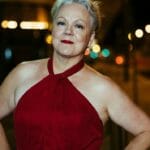Voices from the Future | Carol Duncan
The Australian Bushfires

The Event: Close to 200 bushfires ignited in Australia in early October 2019. They torched nearly 15 million acres of land and destroyed more than 2,000 homes in the Victoria and New South Wales provinces along the country’s eastern seaboard. A total of 24 people lost their lives, and an estimated one billion wild animals perished in the flames.
Carol Duncan wasn’t sure if her father would survive. She was in Newcastle, New South Wales, and her 83-year-old father, John Duncan, lived about six hours north, in the small village of Rappville.
“My father called me around 3 p.m. because he was a bit worried about the approaching fire,” she says. “The amber was traveling 18 miles ahead of the bushfire front, which was unheard of. I urged my father to evacuate to the local school, but he was very adamant to seek shelter in his steel shed. He believed that it wouldn’t burn down.”
Moments later, a local fire department posted advice to Twitter. All Rappville residents were urged to leave their houses immediately. Duncan tried to reach her father, but without luck. The phone connection was a problem.
“I notified the local firefighting volunteers and told them where my father was,” says Duncan, a 53-year-old former radio journalist. ”The shed melted away in the 1,290-degree heat in three minutes. Luckily, he and his partner got out in time. My father lost his house, his shed, his car, everything; he escaped only with his clothes on. I’ve covered various catastrophes, such as storms, floods and fires, in my work. Once it hits this close, it’s a very different experience. The loss and the trauma are incomprehensible.”
Soon after the fire, Duncan paid a visit to her father. He had returned to his village and stayed temporarily in a friend’s house that overlooked his lost property and the surrounding fire debris.
Frustrated, Duncan established a GoFundMe campaign to collect relief money for him. After five days, the prime minister and the premier of New South Wales visited Duncan’s father’s village.
“In one day, we raised $13,000 for my father, because Australians want to help and signal that they care,” she says. “Government representatives did nothing, even though they made promises to the fire victims that they wouldn’t be forgotten. Up to date, burned blocks haven’t been cleared of the debris. Some residents live in their out structures. One man lives in a chicken coop. That is unacceptable.”
Additionally, the fires affected Duncan’s sense of the preciousness of life and stirred a need for a personal change. She quit her latest profession as a digital communications specialist in Sydney and decided to devote her time to support her father and the other fire survivors. Being absent from her husband and two teenage boys five days a week didn’t feel right anymore, either.
“The fire was a catalyst to say to myself: ‘I just cannot be away from my family,’” she says. “My boys are 16 and 18. They are quite big, almost men, and I want to be with them when they are still around. Also, my mother-in-law wasn’t doing so well. Being away just wasn’t worth it.”
Moreover, Duncan doesn’t recognize the country she grew up in.
“I grew up with bushfires, but this wasn’t even a fire season yet,” she says. “As a child, we had over 100 degrees once in a summer. This year, we’ve had over 100 degrees in five to six consecutive days. Australia has been in a grip of drought and extreme heat for the last 10 years now, but the government has ignored all warnings and reports about the changing climate. Not too long ago, 30 leading fire chiefs advised the government about increased fire risk during the bush fire season. Even my father believes that the weather patterns have changed, even if he wouldn’t use the [phrase] ‘climate change.’ Neither does our government. And people are angry with the government. They give millions to the coal industry instead of fire prevention. So, people are fundraising and doing what they can to help bushfire and wildlife services.“
Duncan’s own future includes more volunteer work with the fire survivors and other relief related organizations. She has also decided to be very vocal and express her displeasure with the government’s actions before and during the bushfire crisis.
“Now Australia has its own 9/11,” Duncan says. “We are at a tipping point. From here on, everything is going to change, and I don’t quite know where that is going to land us. One thing is sure. I don’t want to hear my father’s words, ‘I wish I didn’t survive’ again. My future is open; I do anything I can to help people and to prevent future devastating fires from happening.”
— Kirsi M. Hayrinen-Beschloss
